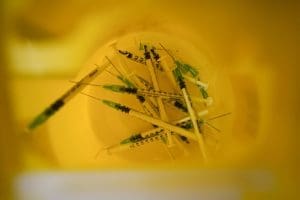WHO warns fears of omicron could spark new vaccine hoarding
Vaccine hoarding by rich nations could complicate efforts to stamp out the pandemic globally.

The World Health Organization expressed concerns Thursday that rich countries spooked by the emergence of the omicron variant could step up the hoarding of COVID-19 vaccines and strain global supplies again, complicating efforts to stamp out the pandemic.
The U.N. health agency, after a meeting of its expert panel on vaccination, reiterated its advice to governments against the widespread use of boosters in their populations so that well-stocked countries instead can send doses to low-income countries that have largely lacked access to them.
“What is going to shut down disease is for everybody who is especially at risk of disease to become vaccinated,” said Dr. Kate O’Brien, head of WHO’s department of immunization, vaccines and biologicals. “We seem to be taking our eye off that ball in countries.”
Meanwhile, the European Union’s drug regulator said Thursday it is closely following the spread of the new variant and whether new vaccines will be required to fight it. Vaccine makers are racing to update their COVID-19 shots against the newest coronavirus threat even before it’s clear a change is needed.
“At this stage, we do not have enough data on the impact of this variant on the effectiveness of the approved vaccines. But we are continuously scanning the horizon to gather evidence in this regard. In any case, we are preparing to take rapid action should the need arise,” Marco Cavaleri, head of biological health threats and vaccines strategy at the European Medicines Agency, said during an online media briefing.
Cavaleri said that the agency expects that “in a matter of three to four months we will be in the position of approving a variant vaccine for omicron.” The time scale is from the start of development until approval, the agency said after the briefing.
Cavaleri also said that the EU agency expects to give the green light to a fifth vaccine for use in the 27-nation bloc before the end of the year, with a decision on a request for authorization of American biotechnology company Novavax’s coronavirus vaccine.
Months of short supplies of COVID-19 vaccines have begun to ease over the last two months or so, and doses are finally getting to needier countries — such as through donations and the U.N.-backed COVAX program — and WHO wants that to continue. It has long decried “vaccine inequity” by which most doses have gone to people in rich countries, whose leaders locked down big stockpiles as a precautionary measure.
“As we head into whatever the omicron situation is going to be, there is risk that the global supply is again going to revert to high-income countries hoarding vaccine to protect — in a sense, in excess — their opportunity for vaccination, and a sort of ‘no-regrets’ kind of approach,” O’Brien said.
“It’s not going to work,” she added. “It’s not going to work from an epidemiological perspective, and it’s not going to work from a transmission perspective unless we actually have vaccine going to all countries, because where transmission continues, that’s where the variants are going to come from.”
Some wealthy governments want to leave no stone unturned to get their populations as close to full vaccination as possible. Many questions remain about the severity, transmissibility and resistance to vaccines of the new omicron variant, which emerged last month in southern Africa and has shown early signs of spreading faster than the widespread and deadly delta variant driving the pandemic now.
O’Brien urged a “rational, global perspective” about “what’s actually going to shut down this pandemic.”
“We have the tools at hand, we have the choices we can make, and the next days and weeks are really going to determine what direction the world decides it’s going to go in, on omicron,” she said.
Nevertheless, WHO says individuals in rich countries should follow the policies of their governments, some of which are enticing people to get boosters, which are additional doses aimed to buck up immunity from earlier jabs that wanes over time.
“An individual in a country, their dose is not going to get shipped to another country because they don’t take the dose,” O’Brien said. “It is country governments, not individuals, who are making decisions that could influence the equitable distribution of vaccines to other countries.”
Recommended

Biden campaign launches new ad focused on Affordable Care Act
Former President Trump has said he wants to do away with the popular health care law.
By Kim Lyons, Pennsylvania Capital-Star - May 08, 2024
Ohio doctors fear effects of emergency abortion care case set to go before U.S. Supreme Court
A federal law that allows emergency departments to treat patients without regard to their ability to pay will be under U.S. Supreme Court scrutiny this week, and Ohio doctors are concerned about the case’s local impact on emergency abortion care.
By Susan Tebben, Ohio Capital Journal - April 23, 2024
House GOP votes to end flu, whooping cough vaccine rules for foster and adoptive families
A bill to eliminate flu and whooping cough vaccine requirements for adoptive and foster families caring for babies and medically fragile kids is heading to the governor’s desk.
By Anita Wadhwani, Tennessee Lookout - March 26, 2024









































































